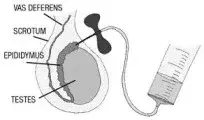
TESA, or Testicular Sperm Aspiration, can be a crucial solution for men facing specific types of infertility. Infertility can be a challenging journey for couples hoping to start a family, and while much attention often focuses on female factors, male infertility is also a significant concern. In this post, we’ll explore what TESA is, how it works, and how it can help men who struggle with infertility.
What is TESA?
Testicular Sperm Aspiration (TESA) is a medical procedure used to collect sperm directly from the testicles. It is particularly useful for men who have problems with sperm production or who cannot ejaculate sperm through the usual methods. TESA is often employed in cases where other treatments for male infertility have not been successful.
Why is TESA Needed?
TESA is usually recommended for men who have:
- Azoospermia: This is a condition where there is no sperm in the semen. It can be due to blockages in the reproductive tract or issues with sperm production.
- Sperm Production Issues: Sometimes, the testicles might produce sperm, but it doesn’t reach the ejaculate due to blockages or other issues.
- Previous Vasectomy: Men who have had a vasectomy might choose TESA as an option to reverse their infertility and pursue their desire to have children. For personalized guidance and treatment, a fertility center in Patna can provide expert support in exploring TESA and other fertility solutions.
How is TESA Performed?
The TESA procedure is relatively straightforward and involves the following steps:
- Preparation: The procedure is usually done under local anesthesia, which numbs the area to minimize discomfort. In some cases, general anesthesia might be used.
- Aspiration: A fine needle is inserted into the testicle through a small incision or puncture. The needle is used to aspirate (or withdraw) a small sample of testicular tissue.
- Sperm Collection: The collected tissue is then processed in a laboratory to extract viable sperm.
- Embryo Creation: If sperm are successfully collected, they can be used in assisted reproductive techniques such as In vitro fertilization (IVF) or Intracytoplasmic Sperm Injection (ICSI) to help achieve pregnancy.
Benefits of TESA
TESA offers several advantages, especially for men who have specific infertility issues:
- Direct Collection: It allows for sperm collection directly from the testicles, which can bypass issues in the reproductive tract.
- Minimally Invasive: The procedure is relatively simple and involves only a small incision or needle insertion.
- Effective for Various Conditions: It can be used for men with different types of infertility issues, including those with blockages or production problems.
What to Expect After TESA
Post-procedure, most men experience only mild discomfort, similar to that of a minor surgical procedure. There may be some swelling or bruising in the testicle area, but this typically resolves within a few days.
Your doctor will provide specific aftercare instructions, which might include avoiding strenuous activities and monitoring for any signs of infection or unusual pain. It’s important to follow these guidelines to ensure proper healing.
Risks and Considerations
Like any medical procedure, TESA carries some risks, although they are generally low. Potential risks include:
- Infection: There is a small risk of infection at the site where the needle was inserted.
- Bleeding: Some bleeding or bruising might occur.
- Discomfort: Temporary discomfort or pain is possible, but this usually subsides quickly.
Before undergoing TESA, it’s crucial to discuss these risks with your doctor and weigh them against the potential benefits. Your healthcare provider can help you understand if TESA is the right choice for your specific situation.
Alternative Options
While TESA is a viable option for many men, it is not the only solution for male infertility. Other options include:
- Medications: Sometimes, medications can help improve sperm production or address underlying conditions affecting fertility.
- Surgical Interventions: Procedures like varicocelectomy (to fix varicoceles) or other surgeries might be recommended depending on the cause of infertility.
- Assisted Reproductive Technologies (ART): Techniques like IVF or ICSI might be suggested based on the couple’s overall situation.
Finding Support and Expert Guidance
If you’re considering TESA or dealing with male infertility, seeking support and expert guidance can make a significant difference. Consulting with a fertility doctor in Patna can provide you with a tailored approach to your situation.
Dr. Rasmi Prasad, a leading IVF specialist at Diwya Vatsalyamamta IVF Center in Patna, Bihar, is well-versed in addressing male infertility issues, including TESA. Her expertise can help you navigate the available options and find the best path forward for your family-building journey.
Conclusion
There is hope in the case of men with particular fertility issues according to TESA. As the method involves the direct extraction of sperm from testicles it is a direct way of having a child by those who have no other chances. If you are dealing with infertility, and learning about TESA and other treatments, you will be better prepared to make the right decisions and get closer to your dream of becoming a parent.
It is important to understand, that struggling with infertility: is a process that takes time, effort, and love. By taking the couple to the correct doctor and receiving moral support, you will be able to find the treatment that is suitable for both of you.





